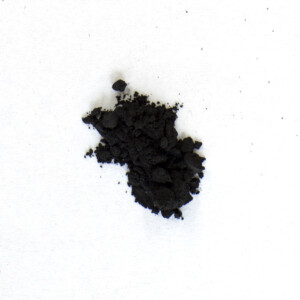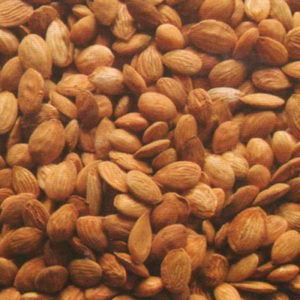Peach Stone Black
Natural organic pigmentComposition and Properties of Peach Stone Black
Peach-stone black is finely ground material obtained by carbonizing (charring) stones of peaches. The pigment is very stable and lightfast as are all carbon blacks and it is compatible with all other pigments.

Pigment

Painted swatch
Names
Color Index
PBk 8, CI 77268
Word origin
From Old French pesche “peach, peach tree” and directly from Medieval Latin pesca, from Late Latin pessica, variant of persica “peach, peach tree,” from Latin malum Persicum, literally “Persian apple,” translating Greek Persikon malon, from Persis “Persia”
From Online Etymology Dictionary
Pfirsichkernschwarz
German
Noir de noyaux de pêches
French
Nero di noccioli di pesca
Italian
Negro de melocotón
Spanish
Preparation
Peach stone black is finely ground material obtained by carbonizing (charring) stones of peaches.

Peach-stones
Identification
Raman Spectrum
(1) Eugenia P. Tomasini, Emilia B. Halac, María Reinoso, Emiliano J. Di Liscia and Marta S. Maier, Micro-Raman spectroscopy of carbon-based black pigments, Journal of Raman Spectroscopy, Special Issue: Raman spectroscopy in art and archaeology, Volume 43, Issue 11, pp. 1671–1675, November 2012.
(2) Alessia Coccato, Jan Jehlicka, Luc Moens and Peter Vandenabeele, Raman spectroscopy for the investigation of carbon-based black pigments, Journal of Raman Spectroscopy, Special Issue: 11th International GeoRaman Conference, Volume 46, Issue 10, pages 1003–1015, October 2015. DOI: 10.1002/jrs.4715. Available as pdf.
Further Reading
References
Winter, J. and West FitzHugh, E., Pigments based on Carbon, in Berrie, B.H. Editor, Artists’ Pigments, A Handbook of Their History and Characteristics, Volume 4, pp. 1-37.
J. Winter, “The Characterization of Pigments Based on Carbon” Studies in Conservation, 28:49-66, 1983.
S. Muntwyler, J. Lipscher, HP. Schneider, Das Farbenbuch, 2nd. Ed., 2023, alataverlag Elsau, pp. 160-65.
